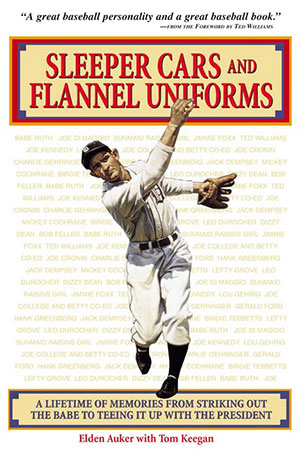Kansas Profile – Now That’s Rural: Elden Auker, professional baseball player
At a glance: Elden Auker grew up playing ball in rural northwest Kansas and then played three sports at K-State. He was voted All-Big 6 Conference in football, baseball, and basketball and went on to a successful ten-year career as a pitcher in major league baseball.
More information: Ron Wilson, rwilson@ksu.edu, 785-532-7690
Photos: Ron Wilson | Book cover: Sleeper Cars and Flannel Uniforms
Website: Huck Boyd National Institute for Rural Development
Jan. 8, 2025

By Ron Wilson, director of the Huck Boyd National Institute for Rural Development at Kansas State University
Who was the greatest all-around athlete in Kansas State University history?
That question can spark a long conversation. The players of today are incredibly athletic and well-trained, but they are also specialized. In modern sports, athletes need to concentrate on one particular sport in order to succeed.
So when we ask about an all-around college athlete (meaning one who succeeded simultaneously in multiple collegiate sports), a person has to go back many years. Imagine a single ballplayer who would be voted all-conference in football, basketball and baseball.
 That’s an amazing accomplishment, probably not achievable in the structure of modern sports. But such a player graduated from K-State in 1932. His name was Elden Auker, and he came from rural Kansas.
That’s an amazing accomplishment, probably not achievable in the structure of modern sports. But such a player graduated from K-State in 1932. His name was Elden Auker, and he came from rural Kansas.
Auker was born in Norcatur in 1910. In 2001, he published a book about his experiences in professional baseball. The book is titled Sleeper Cars and Flannel Uniforms, and it is the primary source for this profile.
At right: Book cover, Sleeper Cars and Flannel Uniforms by Eldon Auker | Download this photo
As a child, Elden Auker’s job was to clean out the barn, milk the Holstein cow every morning and night, and deliver bottles of milk to customers in town. Those customers, by the way, were charged five cents a quart.
He grew up hunting and playing ball with his friends. After one successful basketball tournament game, the referee asked him if he had plans to go to college (there were no scholarships then). Auker replied that he was planning to go to Nebraska, where they had a job lined up for him.
The referee said, “You’re a Kansas boy and Kansas boys should go to college in Kansas. We’ve got a job for you down here too.”
That referee also happened to be the head basketball and baseball coach at K-State.
Auker went to Manhattan, took the job, and joined the football, basketball and baseball teams. His job was to open the on-campus drug store in the morning, clean everything, mop all the floors, and then mop and lock up at night. For all that, he got paid one dollar.
Auker was truly an all-around athlete. He was voted All-Big 6 in baseball, football and basketball. During his time, the football team went 8-2, the baseball team went 16-9, and the basketball team – of which he was captain -- was conference runner-up. One publication named Auker an All-American in all three sports.
More importantly, he won the heart of a pretty young co-ed named Mildred. They would be married for 73 years until his death.
After he graduated from K-State, Auker had options to play pro ball. He was offered a contract to play football for the Chicago Bears, which sent the famous Bronko Nagurski to encourage him to sign. Auker almost signed but chose professional baseball instead, because he didn’t want to wait until fall to get paid. He signed to pitch for the Detroit Tigers.
In 1932, Auker began a ten-year career in professional baseball. This was the era when the uniforms were made of flannel and the teams traveled by train, which was the basis for naming the book Sleeper Cars and Flannel Uniforms.
The subtitle of the book is “A lifetime of memories from striking out the Babe to teeing it up with the President.” Auker did, indeed, strike out Babe Ruth and, much later, play golf with President Ford.
He played baseball with such players as Babe Ruth, Lou Gehrig, Jimmie Foxx, Goose Goslin, Ted Williams and many more. In his first season in the big leagues, he went 15-7 and helped his team win the pennant. During his career, he pitched in two World Series and was the winning pitcher in one. His ten-year statistics included 333 games and an astounding 128 complete games – unthinkable in modern baseball.
In 1942, he retired from baseball to join the war effort and made a difference by going on to a successful business career. Overall, it’s a remarkable record for someone from the rural community of Norcatur, population 159 people. Now, that’s rural.
In 1989, then-K-State President James McCain named Auker the “greatest all-around athlete in K-State history.” For his era, Elden Auker was number 1.
Audio and text files of Kansas Profiles are available at www.huckboydinstitute.org/kansas-profiles. For more information about the Huck Boyd Institute, interested persons can visit www.huckboydinstitute.org.
***

K‑State Research and Extension is a short name for the Kansas State University Agricultural Experiment Station and Cooperative Extension Service, a program designed to generate and distribute useful knowledge for the well‑being of Kansans. Supported by county, state, federal and private funds, the program has county extension offices, experiment fields, area extension offices and regional research centers statewide. Its headquarters is on the K‑State campus in Manhattan. For more information, visit www.ksre.ksu.edu. K-State Research and Extension is an equal opportunity provider and employer.